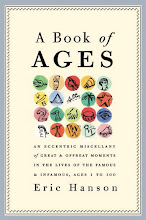On the day after our maternal parents have been celebrated, kissed, given potted plants and cards drawn with crayon and plaster handprints of small children, we are left to wonder what it's all about. Motherhood is one of many themes in A Book of Ages. No surprise, really. It's a book about life's changes, the relationships we nurture and endure, and there is no relationship more profound than that of mother and child.
Famous people have mothers too. Mothers who died young, like Lincoln's, Somerset Maugham's, Poe's, Orson Welles's and Mary McCarthy's. Allen Ginsberg's mother was institutionalized when he was six, Cary Grant's when he was nine. Marilyn Monroe's mother was unable to raise her. Hitler's smothered him with affection. Buster Keaton's and Judy Garland's parents took them into the family business, which happened to be show business. Eudora Welty surrendered her New York writing career to care for her mother back in Mississippi. Child monarchs receive a legacy as heavy as any family curse. Most parents do the best they know how in the circumstances they are given, and their children muddle through. I found this again and again in the lives I describe in the book.
When P. G. Wodehouse was two his parents returned to British Hong Kong, leaving the youngster in the care of assorted maternal aunts. The adult Wodehouse didn't bear a grudge. Dickens's mother allowed him to be removed from school and put to work in a shoe polish factory at the age of twelve, and he never forgave her. In both cases, these events became part of their fiction. In an important sense we are children all of our lives, and as parents we re-enact what we learned.
Sunday, May 10, 2009
Mother's Day
Subscribe to:
Post Comments (Atom)





No comments:
Post a Comment